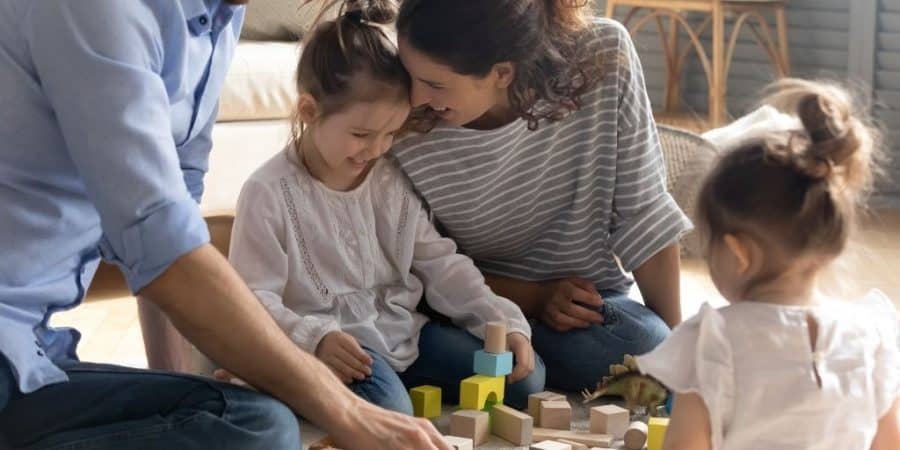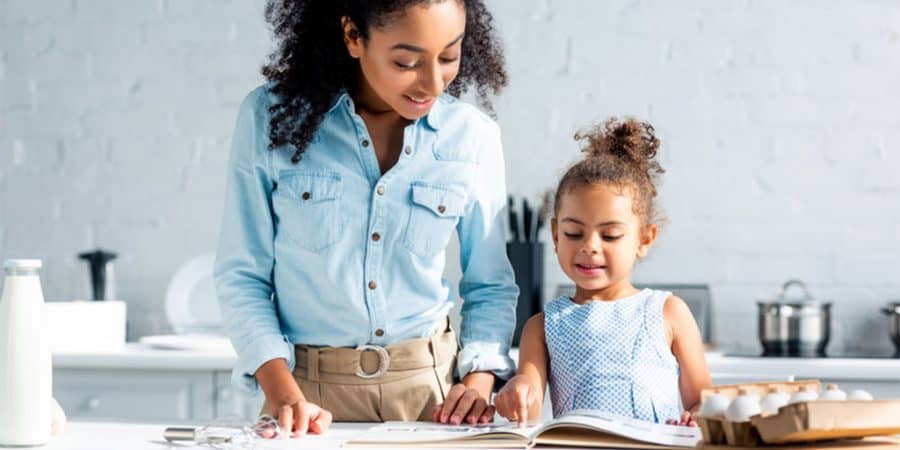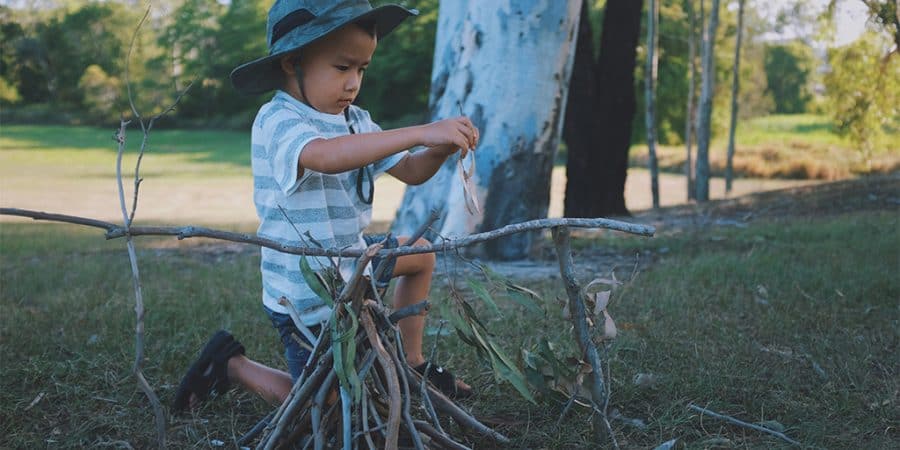Are you ready to embrace the importance of playtime this year?
As we enter the new year, let’s explore the importance of play and building habits for a year full of more play.
The Importance of Play in Early Childhood
Play is more than just having fun; it’s an important part of growing up. Research shows that play adds lasting social, emotional, mental, and physical benefits to children!
It helps with making friends, understanding feelings, thinking and learning, and keeping our bodies active and healthy. Not only does play act as a stress reducer, but it also creates connections. The benefits of play in early childhood are reason enough to incorporate daily healthy play habits.
Check out these reasons why play is important for kids:
- Social Development: Through play, individuals learn to interact with others, negotiate, and develop social skills.
- Emotional Development: Play provides a platform for expressing emotions, learning to regulate them, and developing emotional intelligence.
- Cognitive Development: Play stimulates the brain and helps in the development of cognitive functions.
- Physical Development: Play activities, such as running, jumping, and climbing, help children develop their gross motor skills.
- Language Development: Play provides a context for language development through storytelling, role-playing, or engaging in conversations during play.
- Imagination and Creativity: Play encourages imaginative thinking and creativity.
- Relationships: Play enhances social bonds, whether among children or between parents and children.
- Problem-Solving Skills: Through play, individuals learn to strategize, make decisions, and overcome obstacles.

The Need for More Playtime
Why do kids need more playtime? Playtime is essential for a child’s physical, cognitive, emotional, and social development, fostering problem-solving, communication, and cooperation in a fun setting. It allows them to be free-spirited, creative, and flexible thinkers, unleashing their imaginations in pure, self-directed, free-flowing fun.
There are many types of play, from imaginative and free play to constructive, exploratory, creative, outdoor, and block play—all offering undeniable benefits.
How can we make this year healthier, happier, meaningful, and more impactful? Sure better food choices and exercise are important, but one thing to add is more playtime!
Are you asking yourself, “How do I add more play?” Where will I get more time?” The beauty of play is that the more you do it, the easier it gets and the happier you will be.
Could you use a little more play in your life?
Here are 6 daily habits to improve life for a healthier, happier year full of more play.
1. Prioritize Play
What’s play? We define play as the intersection of fun and discovery—a spontaneous activity that brings joy.
You heard it right. Play is about spontaneity. Amidst busy schedules and daily responsibilities, finding small pockets of time for daily play is crucial.
Even if you’re a bit rusty because it’s been a while since your last play session, that’s OK.
Let’s go ahead and calendar it until it becomes a healthy daily habit. Schedule playtime just like you do other essential aspects of your life—it’s crucial for your family.
Need some guidance? Consider these tips:
- Let playtime be silly, creative, or imaginative.
- Take cues from your kids—they’re the play experts.
- Designate a day each week for family playtime. Whether it’s a bike ride, hike, outdoor activities, crafts, games, or block activities.
- For a fun twist, add a monthly-themed night. Think breakfast for dinner, taco night, or game night. Make it a regular family activity, and involve the kids in the planning!
So, here’s your assignment: schedule it, enjoy it, and watch as play becomes a part of your family’s routine.
2. Create Screen-Free Zones and Limit Screen Time
Are you looking for ways to add more time to play? Reducing screen use is an easy way to make room for more play. We often find ourselves glued to screens—TV, mindlessly scrolling on phones, you name it.
Establish screen-free zones and implement a family media plan to free up time. Clearly define when and where devices are off-limits. For example, no devices during dinner, homework, or the last hour before bedtime.
Instead, use that pre-bed hour to wind down together. Read, play board games, or solve puzzles. Not only does it bring everyone together, but it also sets the stage for a good night’s sleep.
For the little ones (2 to 5 years old), stick to the American Academy of Pediatrics recommendation: 1-hour max of high-quality programming per day.
Explore more media tips for young minds—a small change for more play and healthier habits.
3. Connect with your family through play
Now that play is a priority and screens are in check, how do you make the most of that extra time? Make the importance of playtime an opportunity to connect, interact, and engage with your child.
Expose them to various home experiences like cooking, music, art, or dance. Keep it easy—read, talk, or sing together. Play doesn’t have to be fancy or costly.
- Tell stories or have them tell you a story. Our kids loved it when their dad told them stories. They chose the subject, and he made up the story! Ever notice your child light up to a story about pink dolphins?
- Another family favorite activity is playing music and having a dance party. Grab a few glow sticks and turn off the lights for special occasions! Have you seen the sheer joy on their face dancing to their favorite song?
- Try this simple yet fun idea: create a maze with giant building blocks and a climbing triangle. Kids and adults can move through it or have a relay contest. Let the kids roll balls or drive their cars and trucks through it. Engaging in more play doesn’t have to break the bank.
Need more examples of activities? Check out the Lego Foundation’s Let’s Play Activities Generator.
So, prioritize play, cut the screen time, and enjoy the connection. Spend time with your children, playing and listening to them.

Engaged play increases your happiness, aligns you with your deepest needs, and is a huge predictor of your well-being.
Kathleen Alfano
Engaged play isn’t just fun; it boosts your happiness and well-being. Your family playtime just got a whole lot richer.
Check out the AAP’s insights on the Power of Play.
4. Provide Plenty Of Free Playtime
The pandemic had a silver lining—families scaled back on scheduled activities. While initially challenging, it brought families closer and gave our children more free play time!
But here’s the thing: don’t rush to fill that time or become the play activity director. Kids need space to be creative and use their imaginations. Ensure they have plenty of free, unstructured playtime.
During unstructured play, children often encounter problems that require creative solutions. Whether it’s figuring out how to build a tower of blocks, resolving conflicts with playmates, or inventing imaginative scenarios, these enhance their problem-solving skills.
Above all, let kids learn to master their own lives and find solutions to their problems. This cultivates independence, resilience, and problem-solving skills, building confidence and a sense of responsibility.
The presence or absence of play, particularly in child development, has a great deal to do with competency, resiliency, emotional health [and] brain size.
Dr. Stuart Brown
Are you ready for the next healthy daily habit?
5. Foster Independent Play
With more free playtime on the agenda, it’s time to encourage all types of play, especially independent, hands-on, and imaginative play. Empower your kids to experiment, ask questions, and explore their own interests.
Remember that this is their time for discovery, not an agenda you must micromanage.
Children who can make choices and decisions during playtime learn to rely on themselves. This autonomy builds a sense of independence, helping them gain self-confidence.
By allowing kids to take charge of their playtime, you enable them to overcome challenges and gain valuable experience. They discover what works, what doesn’t, and how to improve—a valuable lesson that extends beyond play.

Kids need time to be bored; That is how creativity is born.
Melanie Jean Juneau
In addition to extending playtime, offer open-ended toys. These toys can be used in multiple ways and inspire imagination and creativity.
For more insights on toys that promote open-ended play, consult the AAP’s recommendations.
6. The importance of playing with your child
Now, let’s talk about our final daily healthy habit: recognizing and modeling the importance of playtime. Add play to your daily routine, whether in outdoor playtime or an indoor activity.
Playing with your child is more than just fun; it’s a strong bonding and developmental tool. Activities can be calm or active, done alone or with others.
- Engaging in play fosters communication and a solid emotional connection.
- You contribute to their cognitive and physical development as an actively involved parent.
Remember, play isn’t just for kids; it’s equally beneficial for adults. Joining in playful activities with your child relieves stress, offering you a break from daily pressures. It contributes to your overall well-being and reinforces a positive, happy atmosphere at home.
So, add play to your routine not just as a task but as a valuable investment in your child’s development and your family’s overall well-being.
Make play a non-negotiable part of your routine.
How will your family make this year more playful?
What lasting memories do you plan to create?
We would love for you to share your thoughts on Instagram and Facebook! Use #AYearFullofPlay. #AMorePlayfulYear
Here’s to a healthier, happier year full of more play!
It Is Time To Get Busy And Play! Are You Ready?
Drop in your info and receive play inspiration, fun activities, and special offers directly to your inbox. Plus, we will send you your FREE Indoor Activities Printable!
